- Home
- Sherry Thomas
Ravishing the Heiress Page 10
Ravishing the Heiress Read online
Page 10
“You would not believe the flush commodes that the man in London tried to sell me. They had the queen’s face painted in the bowl.”
Lord Fitzhugh choked on his lamb. “You are making this up.”
“I am not. I was aghast, while the man tried to reassure me that it was all perfectly proper.”
“I hope you did not buy any. I don’t think I can—” They stared at each other for a moment and both burst out laughing.
“No, neither can I—ever!” she declared emphatically, still laughing. “No, our new commodes will be blue enamel, with white daisies.”
He choked again. “Daisies?”
“Believe me, I tried to find a more masculine commode—something with maybe a hunt scene or a dragon painted inside—but such a thing apparently does not exist.”
“Daisies,” he still sounded dazed. “My friends will never stop laughing.”
It was the first time he ever alluded to the possible presence of his friends at his home. For a moment her imagination ran away and she saw a crowded drawing room, full of laughter and high spirits. And she saw the two of them at the center of all that cheerful goodwill, Lord and Lady Fitzhugh. And someone raising his glass, crying, “To our delightful hosts.”
“Good thing I’m not inviting anyone here,” said the real-life Lord Fitzhugh.
She bent her face to her plate, so he would not see her disappointment.
She accepted this marriage for the alliance of convenience it was. But when they worked toward a common purpose, when they conspired to keep the secret of the house’s “repairs” from the rest of the world, and when he sat across from the table from her and laughed, it was nearly impossible to believe that they were not building something together.
They were: a better house.
And nothing else.
Lord Fitzhugh left Henley Park frequently. Most of the time he left in the morning and returned at night—he’d stop by Oxford to see both Helena and Lord Hastings, and then call on Venetia, whose house was not too far from the university. But occasionally, he stayed away for longer.
When he told Millie he’d be gone a week, she issued an invitation to her mother to come stay with her—her father would be indignant about the north wing, but Mrs. Graves would understand their choice to not burden themselves and their heirs with a house that could never be adequately maintained.
Mrs. Graves, when she came, was more than a little shocked at the architectural skeleton of what had once been the north wing. “Whose decision was this?” she asked, her jaw slack.
“It was a joint decision,” answered Millie. She could not help the note of pride seeping into her voice. “Our thoughts are exactly aligned on this matter.”
Mrs. Graves considered the remnants of the north wing for another minute. Then, she smiled and gave Millie’s hand a squeeze. “Very good, my love. Keep on making these joint decisions. They will give you a foundation upon which to build a life.”
It was late November, the days cold and damp. Millie and Mrs. Graves spent most of their time inside, drinking hot cocoa and discussing the manor’s many pressing needs. But on the day of Mrs. Graves’s departure, the sky cleared to a glorious blue and they took a walk on the grounds of Henley Park.
Millie showed Mrs. Graves the walled kitchen garden. She’d been busy hiring more staff for the estate. They were still shorthanded, but work had begun on clearing the kitchen garden.
She gestured at a row of apple, pear, and quince trees espaliered to the southern wall of the garden. “Mr. Johnson, our new head gardener, believes that these fruit trees may yet be saved. He and his apprentices pruned back years of overgrowth just last week. Mrs. Gibson is waiting for them to bear fruit to make jams and preserves.”
“Will the fruit trees be the only ones bearing fruit in Henley Park next year?” asked Mrs. Graves. “Your father is eager to know.”
“We’ll also be putting in beds of strawberries—they will bear fruits. But if Father is referring to a grandchild, then I’m afraid he’ll have to wait quite a while longer.”
“Does Lord Fitzhugh not visit your chamber?”
Embarrassment singed Millie’s cheeks but she kept her voice detached. “That is another one of our joint decisions. I know Father would prefer a grandson as soon as possible, but neither Lord Fitzhugh nor I want children now and our wishes should count in this matter. More than Father’s.”
Mrs. Graves was silent. They walked past beds of dormant weeds that had yet to be cleared and an old wooden beehive, the residents of which had long ago left for better blossoms elsewhere.
“Your own garden, my dear, have you given any thoughts to it?”
Millie exhaled in relief—and gratitude—at her mother’s acceptance. “Yes, I’ve thought about it. But I’ve yet to set anything into motion.”
Mrs. Graves twined her arm with Millie’s. “Don’t forget it come spring.”
Millie looked toward her empty house. “Will it make me happy?”
“That I cannot answer, my love. But it will give you something to do and something to look forward to—as well as a place of your own.” Mrs. Graves set her gloved hand briefly against Millie’s cheek. “It may not equal happiness, but it is not a bad place to start.”
Fitz returned on a Sunday afternoon.
The servants had the day off; the house was silent. He went through the correspondence that had accumulated for him. A letter from Colonel Clements caught his attention: The Clementses planned to visit him after Christmas.
He immediately went in search of his wife.
She was not in the house. He looked in the gardens, the stables, and near the badly choked trout stream—no sign of her. Finally, as he approached the house from the north side, he heard the sounds of demolition.
But it was Sunday. The village men were at their pub; no one worked.
He rounded a wall. His wife, hatless, in a sack of a dress and a brown cloak, stood in a room that had now become detached from the rest of the house, wielding one of the smaller sledgehammers, going after a fireplace. She’d broken through the facade of the mantel and now swung the sledgehammer at the bricks underneath.
The door was already gone. He knocked on the window frame.
She spun around. “Oh, you came back.”
“What are you doing?”
“Well, when you did it, you seemed to enjoy yourself. So I thought I’d have a go at it.”
Sometimes he forgot that he was not the only unhappy spouse in this marriage. That she too wanted to smash things.
“You are going to give yourself blisters.”
“Not yet.”
She swung the sledgehammer again and dislodged several bricks. She also managed to dislodge a lock of hair from her chignon, which was too old a style on a seventeen-year-old girl, even if she was a married ladyship.
He took off his overcoat and picked up a bigger sledgehammer. “Need some help?”
She glanced at him, surprised. “Why not?”
They settled into a steady rhythm. For a girl who’d never done anything more strenuous than lifting a teacup, she was quite handy with her sledgehammer—and strong. They each swung in turn at the fireplace, and she kept up with him strike for strike.
When all that remained of the fireplace was a pile of bricks, they were both panting. She placed her hand over her heart, her cheeks brightly flushed. “Well, that was good.”
He tossed aside his sledgehammer. “Is there anything to eat?”
“We’ve a sponge cake and a beef pie in the larder.”
They made their way together to the kitchen, where several stock pots sat simmering. He filled a pot with water, stoked the fire, and set it to boil. She, meanwhile, found some plates and silverware, and located the sponge cake and the beef pie.
“Missing your fellow?” he asked after he’d finished his portion of the beef pie.
She raised an eyebrow in question.
“That was why you were wrecking the fireplace, wasn’t it?”
She shrugged. “Maybe.”
He felt a pang of sympathy for her. He could always find someone willing to give him a few hours of oblivion. How did she cope?
“How was London?” she asked. “Did you enjoy it?”
He caught an undertone in her words. Goodness, she knew precisely what he’d been up to in London. The girl was not as prim as he’d made her out to be. “It was all right.”
“Good,” she said. “I’m glad.”
He caught something else to her tone. “Are you?”
She looked directly at him, all maidenly innocence again. “Why wouldn’t I want you to have a good time?”
He had no answer for that. So he gave her Colonel Clements’s letter. “The colonel is coming to visit.”
She scanned the letter. To her credit, she didn’t turn a hair. “Well, we’d better annihilate some more of the north wing after tea, ought we not?”
Ready?” Fitz asked, as the brougham carrying Colonel and Mrs. Clements pulled into view.
Lady Fitzhugh nodded. She had on her most somber dress, her hair in a chignon again—this time Fitz approved. They were two minors going up against a formidable man and this was no time for her to look her age.
“Are you ready?” she murmured.
“I must confess: I’m rather looking forward to this.”
“I came, I saw, I smashed,” she said drily.
“Precisely.”
The carriage came to a stop before the house. As the drive had been repaved after the building of the north wing to show it off during the approach, the colonel would have already seen its absence.
And indeed, before they could utter a welcome, the colonel barked, “What happened to the manor, Fitz?”
“Colonel,” said Fitz, “Mrs. Clements, so delighted you could join us.”
“What a lovely brooch, Mrs. Clements,” chirped his wife. “Please, come in.”
Colonel Clements was not so easily distracted. “You will answer my question. What happened to the manor?” he bellowed as they entered the manor.
Fitz felt himself perspiring. “We are in the midst of repairs still, sir. Please excuse the state of the house.”
“Repairs? Half of the manor is gone.”
“Sometimes repairs involve unanticipated results.”
“Such results are unacceptable. You will rebuild the north wing.”
“Of course we will put the manor to rights. But that is not what we are about to do tonight,” said Lady Fitzhugh, with a confidence and a skill that belied her years. “Tea, Mrs. Clements?”
Colonel Clements would not let the subject drop. “I cannot believe you countenanced this destruction of your home, Lady Fitzhugh.”
Fitz sucked in a breath. To pretend Colonel Clements was overreacting was one thing, to be subject to his direct ire, quite another. Lady Fitzhugh, however, was not the least bit intimidated. “Countenanced it, sir? No, I encouraged it. It was my idea.”
She didn’t just have audacity. She had enormous balls.
Colonel Clements sputtered. “Explain yourself, young lady.”
“Had the north wing been better built, Lord Fitzhugh and I would have endeavored to rehabilitate it. However, it was ill conceived and badly executed. Even if we restored it today, we still must keep restoring it forevermore, committing infinite outlays of funds so that it does not once again fall into disrepair. And since no one is possessed of infinite funds, we chose to have a more modest house that is within our means of upkeep.
“The other choice is to someday sell my future firstborn son on the marriage mart. And that I absolutely refuse to even contemplate. Lord Fitzhugh had to submit to such a fate; that was enough. It will not happen again, not while I have a breath left.”
Her tone was eminently reasonable and she maintained a friendly smile throughout. But there was no mistaking the underlying vehemence of her words. Colonel Clements was rendered momentarily speechless. And Fitz—it began to dawn on him that he had married no ordinary girl.
Tea was brought in. Lady Fitzhugh poured for everyone.
“This is excellent tea, Lady Fitzhugh,” said Mrs. Clements.
“This is utter heresy.” Colonel Clements found his voice. “The house is entailed. You cannot—”
“Colonel, you will not upset our hosts. Why don’t you have some of this lovely sandwich?” said Mrs. Clements firmly. “Now, Lady Fitzhugh, tell me how you are finding Somerset.”
And that was that.
At the end of tea, with the Clementses shown up to their room to change for dinner, Fitz approached his wife and squeezed her hand. “Well done, old girl.”
She looked at him, surprised by his gesture. Then she smiled—she was a pretty girl after all, with nice, even teeth. “You did very well yourself. Now make sure you are amenable to everything the colonel says for the rest of their visit.”
He nodded, understanding her perfectly. “I will be most abjectly agreeable.”
Not all the north wing was smashed. Much of it was carefully preserved: The glass panes of the conservatory were earmarked for the rebuilding of the greenhouses, the stones of the wall for a later restoration of the kitchen, and the roof tiles for the chicken coop, the dovecote, and the mushroom house.
More curiously, however, Lord Fitzhugh had left a fifteen-foot-long section of wall standing. When Millie asked him why the wall had not been knocked down along with everything else, he’d said lightly, “For those days when we are again in the mood to smash something.”
The first of such days came a week after the first anniversary of their marriage, which passed unremarked.
She heard the sound of the sledgehammer from her sitting room, early in the morning. The answer to her question was found in the Times. Miss Pelham’s mother had announced the betrothal of her daughter to a Captain Englewood. The name was somewhat familiar. She dug up the guest list from her wedding and there was a clan of Englewoods. Captain Englewood, it seemed, was either an Eton classmate of Lord Fitzhugh’s or the elder brother of a classmate.
At noon she took a sandwich and a flask of tea to him. In his shirtsleeves, he sat on an empty windowsill, his head resting against the frame of the wall, Alice in his hand.
“I’m sorry,” she said. It hurt her to see him in pain.
He shrugged. “It was always going to happen.”
“But you would have preferred that it happened later—or not at all.”
“I won’t deny there is a part of me that never wants to let go of her. But I don’t wish her to go through life alone; it would be far better for her to marry. If only the thought of it didn’t make me so—”
He looked up at the sky. “I haven’t kept up with her news—when we married, I resolved to remove myself from her life entirely. So I don’t know the circumstances surrounding her engagement. On the one hand, I’m worried—terrified—that she said yes to Captain Englewood simply because she could no longer stand to be alone. On the other hand, she could be in love with him and he could very well turn out to be a wonderful husband to her. And does this thought make me glad? Not at all. If she is miserable, I am miserable. If she’s happy, I’ll still be here, taking a sledgehammer to a wall.”
Millie didn’t know what to do. Or what to say. Tears welled in her eyes and she let them fall. What was the point of not crying? His pain and her own seemed one strangely whole entity: a longing for what could not be regained, or gained in the first place.
She wiped away her tears before he could see them.
“Anyway,” he said, “thank you for my lunch. I’m sure you have much to do around the house.”
In other words, he wished to be alone now.
“I can—I can do those things tomorrow,” she ventured.
He shook his head slightly. “It’s very kind of you, but it’s hot and dusty out here.”
“Right,” she said. “I’ll go back inside, then, where it’s much nicer.”
He did not look at her. He had eyes only for Alice, his be
loved Alice.
When would she remember that their pain was not the same? That while she would welcome any opportunity to be close to him, even if it was to hear of his love for another woman, he, on the other hand, sometimes simply could not bear the sight of her.
That although occasionally she proved herself an ally, always she was—and always she would be—the personification of all the forces that had kept him from the happiness that should have been his.
Millie resolved to fall out of love with her husband.
She didn’t know why she didn’t think of it earlier. Somehow, when she’d fallen in love, she’d accepted it as a chronic condition, something that must be endured for as long as she lived.
Such could not be true. She must recognize this: There was nothing special about her love. She was simply an ordinary young girl, dazzled by the good looks of an equally young man. What was her love but a desire to possess him? What was his love but a similar drive to own Miss Pelham body and soul?
Some things in life were truly difficult. Finding the source of the Nile, for example. Or exploring the South Pole. But falling out of love with a man who never looked at her twice, why should that prove an insurmountable challenge?
Alice was not quite right. It was September. She should be gorging herself, putting on weight in readiness for her long hibernation, but her appetite was poor. Fitz tempted her with seeds, berries, nuts of all descriptions. He took her on long walks and searched for aphids and other small insects she might find interesting. He had the gardeners germinate various plants so she might have fresh leaf buds, a delicacy she hadn’t enjoyed since spring.
Nothing had any effect. She ate poorly and spent the rest of her waking hours in varying degrees of listlessness, her eyes dim, her breathing labored.
She was getting old. But he’d counted on her to have at least another year in her, twelve more months of gentle snoozing and happy snacking, three hundred sixty-five more days for him to grow accustomed to the fact that she could not live forever.

_preview.jpg) Claiming the Duchess (Fitzhugh Trilogy Book 0.5)
Claiming the Duchess (Fitzhugh Trilogy Book 0.5)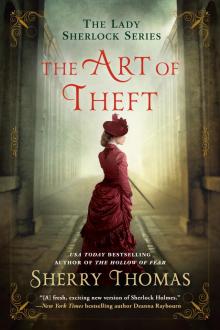 The Art of Theft
The Art of Theft The Magnolia Sword: A Ballad of Mulan
The Magnolia Sword: A Ballad of Mulan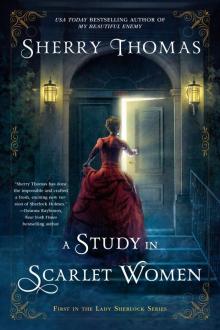 A Study In Scarlet Women
A Study In Scarlet Women The Hollow of Fear
The Hollow of Fear The Magnolia Sword
The Magnolia Sword Beguiling the Beauty ft-1
Beguiling the Beauty ft-1 The Heart is a Universe
The Heart is a Universe The Hidden Blade: A Prequel to My Beautiful Enemy (Heart of Blade)
The Hidden Blade: A Prequel to My Beautiful Enemy (Heart of Blade)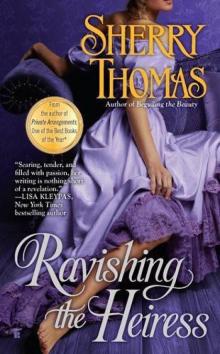 Ravishing the Heiress ft-2
Ravishing the Heiress ft-2 The Immortal Heights
The Immortal Heights The Hidden Blade
The Hidden Blade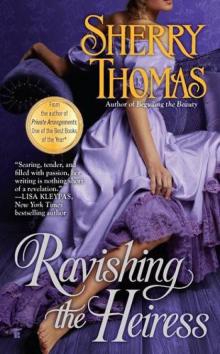 Ravishing the Heiress
Ravishing the Heiress Tempting the Bride
Tempting the Bride The Luckiest Lady in London
The Luckiest Lady in London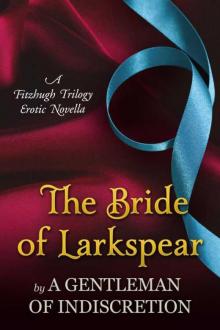 The Bride of Larkspear: A Fitzhugh Trilogy Erotic Novella
The Bride of Larkspear: A Fitzhugh Trilogy Erotic Novella Claiming the Duchess
Claiming the Duchess The One in My Heart
The One in My Heart His At Night
His At Night A Dance in Moonlight
A Dance in Moonlight A Conspiracy in Belgravia
A Conspiracy in Belgravia Not Quite a Husband
Not Quite a Husband